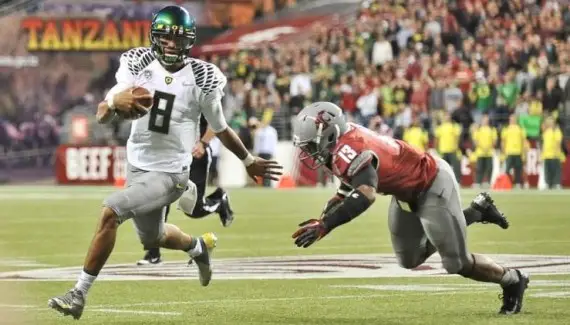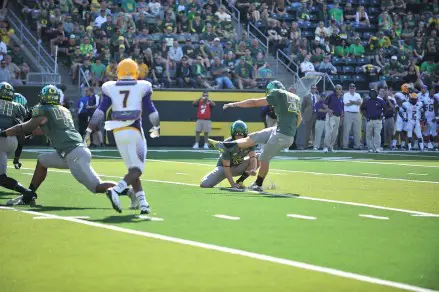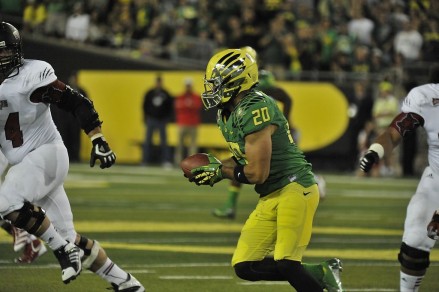Kevin Cline
The Ducks haven’t made four straight BCS bowl games by accident. When a team has elite talent and a transcendent offensive system, it’s gonna win games. Yet Oregon, like every good team, has benefited from some tremendous good fortune.
Since 2009, Oregon experienced a major injury less times than their punters have stepped onto the field. Given the Ducks’ go-for-broke offense where punting is extremely rare, that’s saying something. Key players, especially on offense, have rarely missed long periods of time, and even when they have, the injuries haven’t really cost them. It also helps that the Ducks have been able to plug in backups without missing a beat (think LaMichael James replacing LaGarrette Blount in 2009), but even the deepest teams can’t have multiple major injuries and still appear in BCS bowl games.
In 2009 the Ducks did lose a couple important players. Cornerback Walter Thurmond III tore up his knee in the fourth week, forcing him to miss the rest of the season. Three weeks later, his replacement Willie Glasper suffered his own season-ending injury. Losing the top two corners on the depth chart obviously wasn’t ideal, but other than those two, not many players missed extended periods of time. Jeremiah Masoli missed just one game, which the Ducks won anyway. Safety T.J. Ward missed games 2-through-5, but John Boyett was such a solid replacement that Oregon barely noticed his absence (winning all four Ward-less games). Those casualties were about it.
The next year, backup quarterback Nate Costa severely injured his right knee against Washington, Oregon’s ninth game of 2010. It ended Costa’s season. But besides that (again, Costa was the backup quarterback), the Ducks were incredibly healthy. It’s no coincidence that they advanced to the national championship game that year.
Kicker Rob Beard only participated in one game in 2011, the first of the season against LSU. Injuries derailed his season and he was replaced by Alejandro Maldonado. Maldonado, of course, infamously missed what would have been the game-tying field goal as time expired against USC later that season. Maybe the Ducks would’ve won that game if Beard was active. However, pinning that loss on one kick is completely unfair.
The other injuries that year were basically inconsequential.
The worst injury luck the Ducks have experienced the past four years occurred last season. Both starting guard Carson York and starting safety John Boyett suffered injuries that caused them to miss almost all of 2012 (York missed the last 10 games, Boyett the last 11). Additionally, cornerback Avery Patterson missed the last three games, which included the overtime loss to Stanford. The Ducks certainly would have been more likely to beat the Cardinal with those three players on the field, but Oregon was a play or two away from winning that game anyway – the only game they lost all season.
Notice how most of the injuries mentioned above were to defensive players? Even the minor injuries these past four seasons seem to skew towards the defensive side of the ball. The obvious reason for this is Oregon’s fast-paced offense. The Ducks have constantly been among those teams with the lowest time of possession, simply because all of their plays are so quick. Whether they score or not, they’re off the field in an instant. As a result, Oregon’s offensive players are on the field much less than their defensive players. Not only does that give offensive players fewer opportunities to get injured, it also keeps them fresh, which decreases their injury risk.
Boyett’s injury, for example, was a lingering issue from the prior season. It’s very likely the constant running and hitting built up to a point that his knees just couldn’t take it anymore. When you play as many minutes as he did, injuries like Boyett’s become increasingly likely.
However, no team can avoid season affecting major injuries without having a Haloti Ngata-sized amount of luck. Check out how Nate Costa suffered his (painful to watch) injury:
Messed up field goal attempt, Costa scrambles, runs towards the sideline, play is all but over… pop! Done for the season. So many little things could’ve gone differently in the play that would have prevented Costa from experiencing this tragic fate.
Injuries like Costa’s happen all of the time in football. Whenever you have large, fast men running towards each other and repeatedly colliding, something’s gotta give.
Going into this season the Ducks are certainly aware of this possibility, even though everyone would rather not think about it. We’ve seen so many teams in the past that looked promising going into a season, only to get decimated by injuries.
Look at USC last year. They were the top-ranked team before the season started, and they finished just one game over .500. Injuries certainly weren’t the only reasons for their disappointing season, but they played a huge role.
In 2009, Oklahoma’s quarterback Sam Bradford was coming off a Heisman-winning season in which he led the Sooners to the National Championship Game. They were ranked third in the Coaches Poll going into the season. An 8-5 record was unfathomable. But that’s the record Oklahoma finished with, largely because Bradford missed most of the season due to injuries.
The Ducks fortunately haven’t gone through a season like USC’s or Oklahoma’s in recent years, but one serious injury to Marcus Mariota, De’Anthony Thomas and/or another key player could easily change that. This is a grim outlook, but it’s also a very real possibility.
Luckily for the Ducks, they’ve managed to avoid season-destroying injuries in recent years and they seem to have a system that at least minimizes injuries on the offensive side of the ball. Oregon’s training staff might, in fact, deserve the most credit in this area, but their impact is nearly impossible to measure objectively.
So, even though injuries can be about as predictable as the next big earthquake, there’s a chance the Ducks are actually better at avoiding the major bumps and bruises than most programs. They’ll need to stay extremely healthy this upcoming season if they want to continue this remarkable run.
——————
ANNOUNCEMENTS
*If you would like to join the other 80+ volunteers at FishDuck.com, and have five hours a week to donate… we have slots open for volunteer Editors, Writers, Analysts, Photo Archivists and Social Media Associates. Can you help us manage people? Consider our volunteer Sales Manager and HR Manager positions and give some time each week to help young associates learn! E-mail us at charles@fishduck.
*Don’t miss our football analysis every Tuesday, our Recruiting Update every Wednesday and our new Chip Kelly updates every Friday!
Related Articles:
Chip Kelly Update: Everything's Good Again ...
Chip Kelly Update: Wailing and Gnashing of Teeth
Shock and Awe -- The Oregon Ducks' Football Hangover Effect
Despite Lopsided Score, Georgia State "Never Stopped Believing"
Hope Springs Eternal for Ducks
Incompetent Pac-12 Officials: How Do You Miss ALL of THIS?
Victor is a senior at the University of Oregon, majoring in journalism and minoring in psychology. Victor was born and raised in San Francisco, CA. He is a fan of the San Francisco Giants, San Francisco 49ers, and Golden State Warriors and has naturally fallen in love with the Ducks since he became a UO student. He currently works for the UO campus radio station 88.1 KWVA as a news and sports contributor and hopes to one day become a professional sports reporter. While he loves several sports, baseball has always been his greatest passion.



